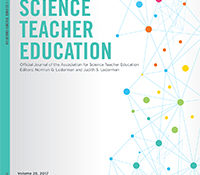tandfonline.com har udgivet en rapport under søgningen “Teacher Education Mathematics”: Teacher professional dialogues during a school intervention: From stabilization to possibility discourse through reflexive noticing Link til kilde
Like this:
Like Loading...

tandfonline.com har udgivet en rapport under søgningen “Teacher Education Mathematics”: ABSTRACT ABSTRACT Science teachers should be able to notice student preconceptions in order to adapt instructions to their students’ needs and support the learning process. Noticing as a core practice of teaching should thus be implemented early in science teacher education. A crucial prerequisite for noticing is knowledge about students’ preconceptions, which is an important element of science teachers’ pedagogical content knowledge. To enhance pre-service teachers’ pedagogical content knowledge, flipped classroom approaches seem especially promising as they combine a theoretical introduction to important didactic concepts with a direct application of these concepts in profession-oriented learning tasks. Furthermore, flipped classrooms seem to satisfy the three basic personal needs of experience in competence, social relatedness, and autonomy according to the self-determination theory… Continue Reading →
Like this:
Like Loading...
tandfonline.com har udgivet en rapport under søgningen “Teacher Education Mathematics”: ABSTRACT ABSTRACT The ability to notice students’ mathematical thinking is key to better understanding student learning and effective teaching. Our professional development program utilized a Child Study Assignment in an attempt to strengthen K–3 teacher noticing. We applied principles of improvement science to improve this assignment to better support the development of teachers’ noticing skills. In this article, we first describe the Child Study Assignment and adjustments made to the assignment across time. Next, we provide suggestions for how this assignment might be adapted in other contexts. Lastly, we present teachers’ perceptions of the usefulness of the Child Study Assignment. Teachers in our professional development program reported that the assignment offered valuable learning experiences, and they often shared their experience… Continue Reading →
Like this:
Like Loading...
eric.ed.gov har udgivet: Research about teacher noticing of students’ mathematical thinking has been an important and ongoing strand of research and practice in mathematics education. Our work extends this agenda by working collaboratively with teachers to learn together how to notice students’ mathematical strengths. The lens on strengths runs counter to the prevalent culture in U.S. schools to overemphasize gaps in students’ understandings. In this paper we describe a video club focused on identifying and naming students’ mathematical strengths and the protocols that support this focus. We illustrate and discuss the important shifts in teachers’ ways of noticing and talking about students’ mathematical activity. We also discuss implications for further research and professional development focused on teacher noticing of students’ math strengths. [For the complete proceedings, see ED583989.] Link til… Continue Reading →
Like this:
Like Loading...
eric.ed.gov har udgivet: This study examines how elementary preservice teachers notice children’s mathematical thinking and how this noticing influences the evaluation of technological resources. In particular, we explore the aspects of thinking to which preservice teachers attend and how they interpret evidence about children’s thinking when using the Spatial-Temporal Math (ST Math) program. Data collection included a group survey administered after an initial exploration of a set of ST Math activities, screencast recordings during which children used and talked about the program, and a reflective writing assignment. The findings of this study show how preservice teachers used their noticing skills (attending and interpreting) in their evaluations of the tool, in some cases prompting them to shift their evaluation on the basis of student thinking. [For the complete proceedings, see ED606556.]… Continue Reading →
Like this:
Like Loading...
eric.ed.gov har udgivet: We report on the development and evaluation of MathVision, a mobile-application designed to develop Virtual Professional Learning Communities through asynchronous discussion about 2nd, 3rd, 4th, and 5th grade students’ mathematical thinking. MathVision allows teachers to upload videos of problems solving sessions using Cognition Based Assessment tasks and foster discussion aligning those strategies to research-based learning progressions for Length and Measurement. Our findings indicate that while it was possible to develop such an interface, sparking productive online discussion was difficult. The application served as a tool for enhancing physical teacher meetings and drawing attention to student thinking consistent with conducting task-based interviews, rather than actually facilitating this talk entirely. [For complete proceedings, see ED581294.] Link til kilde
Like this:
Like Loading...
sciencedirect.com har udgivet: Highlights • The majority of teachers noticed and analyzed content-specific teaching and learning issues. • Few teachers noticed the key teaching and learning issues that led to students’ confusion. • Teachers noticed teaching-related issues in a wide range of areas such as use of probing questions. • Teachers noticed student-related issues in three areas: engagement, ability, and understanding. Abstract Teachers’ noticing is an important skill for learning from and improving their teaching. We investigated what teachers noticed in short video clips of a real classroom teacher’s interaction with students around a mathematics problem by collecting data from 496 U.S. fourth- and fifth-grade teachers from 48 states. Our analyses indicated that 67.5% of teachers’ responses focused on content-specific teaching and learning events, whereas 14% of them attended to… Continue Reading →
Like this:
Like Loading...
sciencedirect.com har udgivet: Highlights • Three technologies were used to develop three components of noticing expertise in mathematics pedagogy courses. • Three-point Framework including Key point, Difficult point, and Critical point was incorporated into technology intervention. • Effects of using Three-point framework along with technology on development of noticing expertise were assessed. • The goal of these interventions was to incorporate noticing expertise as a regular professional practice. Abstract This study investigated effects of employing the Three-point framework (Key Point, Difficult Point, Critical Point) and three technology-aided interventions (online discussions, clinical interviews, and graphic lesson plan construction) on developing preservice teachers’ noticing skills in elementary mathematics pedagogy courses. Pre- and post-intervention assessments revealed significant improvement in the treatment group’s scores, and two case studies illustrated how the interventions can help… Continue Reading →
Like this:
Like Loading...


